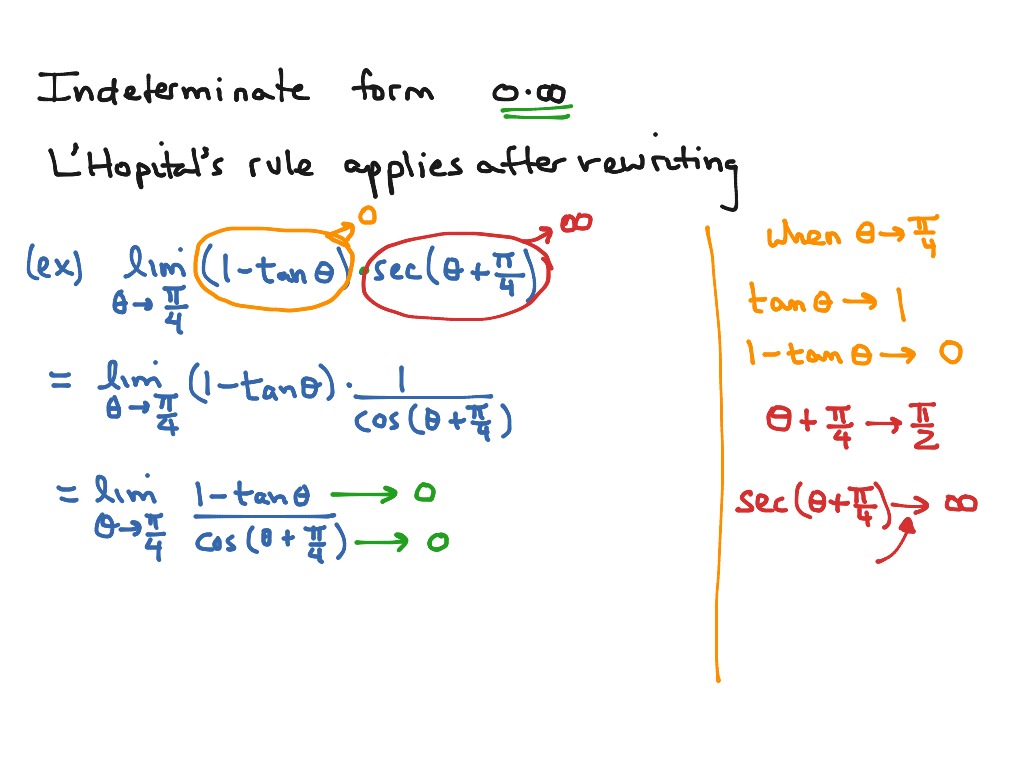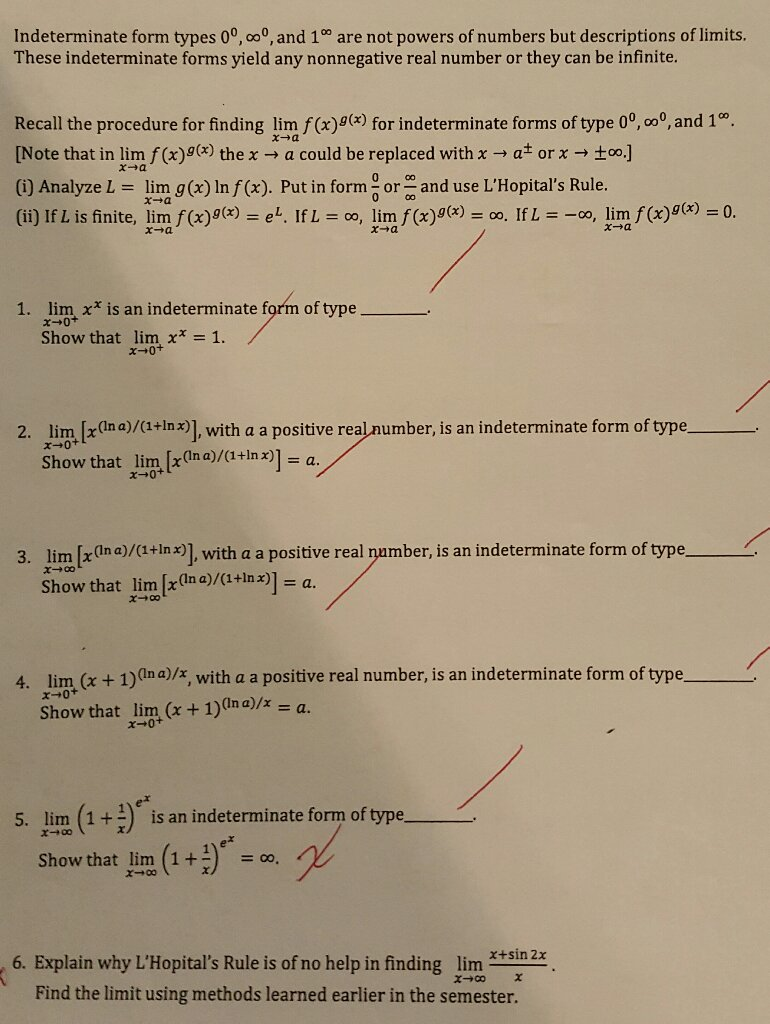0 Infinity Indeterminate Form
0 Infinity Indeterminate Form - If $f(x)$ approaches $0$ from above, then the limit of $\frac{p(x)}{f(x)}$ is infinity. An indeterminate form is an expression formed with two of 1, 0, and infinity, and its value cannot be de determined. You can usually solve a limit of the form $0 \cdot \infty$ using l'hospital's rule by introducing a fraction. If $f(x)$ approaches $0$ from below, then the. The process of finding the. L’hospital’s rule works great on the two indeterminate forms 0/0 and \({{ \pm \,\infty }}/{{ \pm \,\infty }}\;\). Specifically, if $f(x) \to 0$ and $g(x).
Specifically, if $f(x) \to 0$ and $g(x). The process of finding the. If $f(x)$ approaches $0$ from below, then the. L’hospital’s rule works great on the two indeterminate forms 0/0 and \({{ \pm \,\infty }}/{{ \pm \,\infty }}\;\). If $f(x)$ approaches $0$ from above, then the limit of $\frac{p(x)}{f(x)}$ is infinity. You can usually solve a limit of the form $0 \cdot \infty$ using l'hospital's rule by introducing a fraction. An indeterminate form is an expression formed with two of 1, 0, and infinity, and its value cannot be de determined.
You can usually solve a limit of the form $0 \cdot \infty$ using l'hospital's rule by introducing a fraction. The process of finding the. Specifically, if $f(x) \to 0$ and $g(x). If $f(x)$ approaches $0$ from above, then the limit of $\frac{p(x)}{f(x)}$ is infinity. L’hospital’s rule works great on the two indeterminate forms 0/0 and \({{ \pm \,\infty }}/{{ \pm \,\infty }}\;\). An indeterminate form is an expression formed with two of 1, 0, and infinity, and its value cannot be de determined. If $f(x)$ approaches $0$ from below, then the.
Indeterminate Form Infinity Infinity YouTube
Specifically, if $f(x) \to 0$ and $g(x). You can usually solve a limit of the form $0 \cdot \infty$ using l'hospital's rule by introducing a fraction. The process of finding the. If $f(x)$ approaches $0$ from above, then the limit of $\frac{p(x)}{f(x)}$ is infinity. L’hospital’s rule works great on the two indeterminate forms 0/0 and \({{ \pm \,\infty }}/{{ \pm.
6.9 Indeterminate form ZERO times INFINITY YouTube
L’hospital’s rule works great on the two indeterminate forms 0/0 and \({{ \pm \,\infty }}/{{ \pm \,\infty }}\;\). You can usually solve a limit of the form $0 \cdot \infty$ using l'hospital's rule by introducing a fraction. The process of finding the. If $f(x)$ approaches $0$ from below, then the. An indeterminate form is an expression formed with two of.
What Is Infinity Multiplied By 0
If $f(x)$ approaches $0$ from above, then the limit of $\frac{p(x)}{f(x)}$ is infinity. Specifically, if $f(x) \to 0$ and $g(x). The process of finding the. L’hospital’s rule works great on the two indeterminate forms 0/0 and \({{ \pm \,\infty }}/{{ \pm \,\infty }}\;\). An indeterminate form is an expression formed with two of 1, 0, and infinity, and its value.
Calculus Indeterminate Forms YouTube
An indeterminate form is an expression formed with two of 1, 0, and infinity, and its value cannot be de determined. Specifically, if $f(x) \to 0$ and $g(x). If $f(x)$ approaches $0$ from below, then the. If $f(x)$ approaches $0$ from above, then the limit of $\frac{p(x)}{f(x)}$ is infinity. You can usually solve a limit of the form $0 \cdot.
Indeterminate form 0 times INFINITY YouTube
If $f(x)$ approaches $0$ from below, then the. You can usually solve a limit of the form $0 \cdot \infty$ using l'hospital's rule by introducing a fraction. If $f(x)$ approaches $0$ from above, then the limit of $\frac{p(x)}{f(x)}$ is infinity. Specifically, if $f(x) \to 0$ and $g(x). The process of finding the.
Solved Show that 0 infinity is not an indeterminate form by
An indeterminate form is an expression formed with two of 1, 0, and infinity, and its value cannot be de determined. Specifically, if $f(x) \to 0$ and $g(x). You can usually solve a limit of the form $0 \cdot \infty$ using l'hospital's rule by introducing a fraction. The process of finding the. L’hospital’s rule works great on the two indeterminate.
Finding Indeterminate Limits L'Hôpital's Rule 0/0, infinity
An indeterminate form is an expression formed with two of 1, 0, and infinity, and its value cannot be de determined. You can usually solve a limit of the form $0 \cdot \infty$ using l'hospital's rule by introducing a fraction. Specifically, if $f(x) \to 0$ and $g(x). The process of finding the. If $f(x)$ approaches $0$ from below, then the.
Indeterminate form 0*infinity example Math, Calculus, Limits, 0
The process of finding the. An indeterminate form is an expression formed with two of 1, 0, and infinity, and its value cannot be de determined. You can usually solve a limit of the form $0 \cdot \infty$ using l'hospital's rule by introducing a fraction. Specifically, if $f(x) \to 0$ and $g(x). If $f(x)$ approaches $0$ from below, then the.
Indeterminate form types 0^0, infinity^0, and
You can usually solve a limit of the form $0 \cdot \infty$ using l'hospital's rule by introducing a fraction. Specifically, if $f(x) \to 0$ and $g(x). The process of finding the. L’hospital’s rule works great on the two indeterminate forms 0/0 and \({{ \pm \,\infty }}/{{ \pm \,\infty }}\;\). An indeterminate form is an expression formed with two of 1,.
Indeterminate Form 0 to 0 YouTube
You can usually solve a limit of the form $0 \cdot \infty$ using l'hospital's rule by introducing a fraction. An indeterminate form is an expression formed with two of 1, 0, and infinity, and its value cannot be de determined. L’hospital’s rule works great on the two indeterminate forms 0/0 and \({{ \pm \,\infty }}/{{ \pm \,\infty }}\;\). If $f(x)$.
You Can Usually Solve A Limit Of The Form $0 \Cdot \Infty$ Using L'hospital's Rule By Introducing A Fraction.
An indeterminate form is an expression formed with two of 1, 0, and infinity, and its value cannot be de determined. If $f(x)$ approaches $0$ from below, then the. Specifically, if $f(x) \to 0$ and $g(x). The process of finding the.
L’hospital’s Rule Works Great On The Two Indeterminate Forms 0/0 And \({{ \Pm \,\Infty }}/{{ \Pm \,\Infty }}\;\).
If $f(x)$ approaches $0$ from above, then the limit of $\frac{p(x)}{f(x)}$ is infinity.









